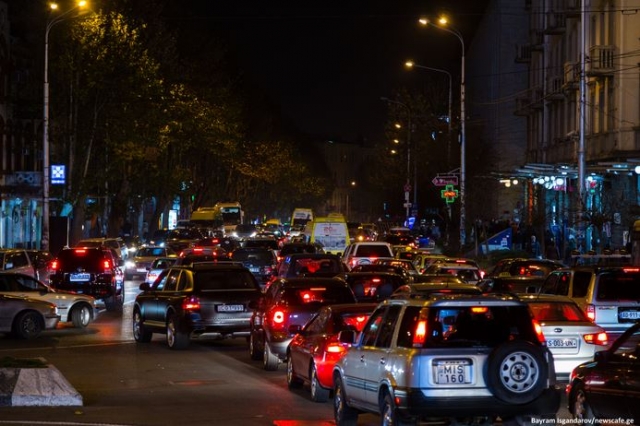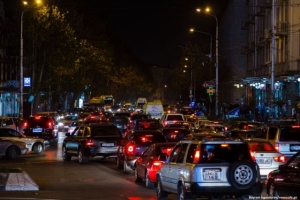An Invisible Pandemic on the Georgian Roads
On January 29, 2016 in Tsalenjikha along the Lia-Jvari road section, a car accident caused the death of 5 people and injured 6.
Those who were injured were taken to hospitals with multiple complications. A few days ago on January 22, a car accident at Gombori ended in another road fatality.
The car crashed into a tree causing the death of a young woman; however her two children survived with only injuries. On January 18 along the Kareli overpass, a car accident caused the death of a 6-year-old girl and 3 others were severely injured. On the second day in Kaspi, a man died in a car crash.
Just a couple of days ago another person died in a road crash in Varketili, a twenty-year-old female pedestrian was hit by the mini-bus in Rustavi in Batumi near the Chakvi tunnel. This incident also ended in a fatally - the driver died at the spot of the accident, while 2 women and 2 men with severe injures were taken to Batumi Referral Hospital.
Unfortunately, the situations presented in the above-mentioned tragedies are not confined to these individual accounts. The number of fatal road accidents in Georgia has become a part of everyday life. Although Georgians are used to hearing these stories, society has only taken the role of a passive spectator. Many people do not account for their own driving behaviors. It is often the actions of one who affects the fate and another – driver’s behavior causes loss of life every day. Often by the time of a road accident, the reason has been identified according to the investigation under Article 276 of the Criminal Code, Section 7 that the traffic violation has already led to the loss of human life.
A lot of people believe road accidents are the results of God and its punishment. Even a legendary racing driver- Michael Schumacher once said: “do not go faster than your guardian angel.” Many pedestrians and drivers also believe road accidents are the fault of the other driver or pedestrian involved, but often fail to consider their selves as the blame. This is a bad approach to this problem, we are not only involved in traffic but often many factors depend on those interactions we have with each other. To cut it short, when we drive a car we are responsible for others, therefore it is essential to respect others and share the roadway.
Fatalities and trauma cases on the roads in Georgia have turned into a pandemic in recent times due to the increasing number of automobiles combined with economic growth. A sense of insecurity on the streets has become apart of our daily lives. Road crashes are often described as “road accidents,” this depiction is inherently wrong because accidents are completely preventable. The UN and international society recognized road crashes to be a problem created by a human error and has appealed to replace the word ”accident” by the word “crash” in order to recognize what we are actually dealing with.
Georgians fails to question why government, businesses and families pay hundreds of millions GEL for the rehabilitation of traumatized individuals involved in car crashes, a completely avoidable situation, with little expense to the State. Why are the families of victims left without a patron? Why do more pedestrians die in road accidents in the majority of cities throughout Georgia? Why more than a thousand adolescents are severely injured, a situation completely avoidable, left with situations that impact the rest of their lives?
Why are there such a large number of car crashes on rehabilitated roads in the last decade, where more than a billion dollars have been invested? Why are more than 40% of new-drivers involved in car crashes? Why do drivers prioritize driving faster than the safe movement of our children? Why is it that 68% of the Georgian population according to poll carried out by the NDI agrees that restoring technical inspection of vehicles and renewal one of the world's aging fleet, yet the politicians have not launched the legislation process?
It is interesting how the Department of Tourism has little to nothing to say about road safety and yet absolutely the majority of tourist coming into Georgia has expressed discontentment and felt unsafe as a pedestrian as well as a passenger. There are so many agencies and councils in the government, but there are no coordinating bodies responsible for road and transport safety. Consequently, there are currently no regulatory plans in the field of road safety meanwhile institutes, businesses, NGO-s, the media and the larger part of society have taken on the role of government.
The most critical problem is not only inactivity of government but the alteration of the inert attitude of society and assurance that everyone’s activity and involvement are given the appropriate education. Improved education, especially for drivers and pedestrians, could assuredly prevent this growing epidemic. An example of how society can alter the government comes from a tragic event that happened in Gudauri at the beginning of January.
A 12-year-old pupil named Salome Tatishvili crashed on the first ski track and died. A 19-year-old boy crashed into her on the ski track causing the death of girl while the boy survived and is still in hospital recovering. This tragedy has become a sharp pain for the whole country and for more than a week, the media, authorities, celebrities and citizens all unanimously demanded order on the ski track, the result were immediate. Due to the pressure from society and the media on the government, a new ski patrol project has begun on the ski resorts.
In just a few weeks, ski patrol appeared on the ski tracks which helps significantly reduce dangers on the slopes in the future. Therefore it is impossible to stop this pandemic on the Georgian roads if we remain as a statistician and continue to count the numbers of deaths on the roads. I would like to make a paraphrase of a well-known writer: we are to become the heroes of a “declared death chronicle”.
The vaccine for this pandemic has been created and it has been proven to work well in both the developed as under-developed world. From the current Georgian perspective, change will not come successfully if the same growing challenges experienced in many under-developed countries of the world are not addressed. We must admit first of all before ourselves and then to the public that this is a man-made pandemic and we there are prescriptions to deal with it.
Author: Gela Kvashilava
Gela Kvashilava is the founder the Partnership for Road Safety fund (http://safedrive.ge), advisory council member and regional consultant of the British organization Eastern Alliance for Safe and Sustainable Transport (www.easst.co.uk), expert at the EU TRACECA road safety project.












